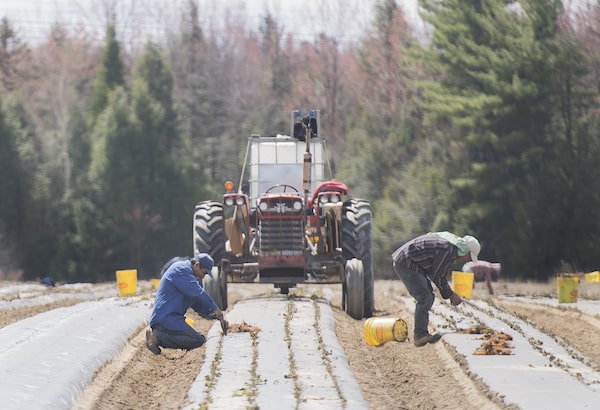
Temporary foreign workers from Mexico plant strawberries on a farm in Mirabel, Que., on May 6, 2020.Graham Hughes/The Canadian Press
As Ottawa considers imposing visa requirements on visitors from Mexico to address a surge in refugee claims, a senior Mexican official says many asylum applicants are being misled by fraudsters in both countries into thinking this approach would enable them to work in Canada.
Roberto Velasco Álvarez, head of the Mexican Foreign Ministry’s North American unit, visited Canada last week to meet with officials from the federal government and Quebec. He spoke to The Globe and Mail on Friday, the same day Prime Minister Justin Trudeau told a Winnipeg audience that organized crime is behind some of the Mexican asylum claims – a significant majority of which are being rejected.
Mr. Velasco said there are organizations in Canada and Mexico “promoting fraudulent schemes” and Mexicans who end up applying for asylum in Canada are sold lies about what awaits them.
“Many times, people don’t really know what they’re signing up for,” Mr. Velasco said, adding that they aren’t aware they could be barred from returning to Canada if they are rejected for asylum. The worst cases, he said, are where Mexicans end up being victims of human trafficking and end up in servitude to those who arranged passage to Canada.
In response, he said, Mexico has launched an information campaign back home and “mobility forums” to explain the perils of participating in asylum-claim schemes and to educate people on legitimate pathways for temporary foreign work in Canada, such as the seasonal agricultural worker program.
It’s also enlisting air carriers to screen for signs of suspicious travel and boosting co-operation with the Canada Border Services Agency.
He said Mexico understands “the pressure that sometimes fraudulent or baseless asylum applications can create” for Canada and is concerned about its own citizens being victimized by these schemes.
“We don’t want them to be put at risk by irresponsible people who are making a business out of this without a real concern for what happens to these people,” Mr. Velasco said.
The former Harper government imposed a visa requirement on Mexicans in 2009 and Prime Minister Justin Trudeau scrapped it in 2016. Conservative Leader Pierre Poilievre has called for Ottawa to reimpose visas.
The federal government is considering immigration measures on visiting Mexicans after Quebec Premier François Legault in January urged Ottawa in a letter to slow the influx of refugees he said are straining his province’s resources.
“Mexican nationals represent a growing proportion of the asylum seekers arriving in Quebec,” Mr. Legault said in the letter. “The possibility of entering Canada from Mexico without a visa certainly explains part of the flow of asylum seekers.”
The Immigration and Refugee Board has reported a surge in refugee claims by Mexicans arriving in Canada, rising to 17,490 claims in the first nine months of 2023 from 250 in all of 2016. Immigration Minister Marc Miller told a Commons committee earlier this month that the acceptance rate for claims is close to 30 per cent.
Mr. Velasco said most Mexican applications for asylum in Canada are rejected “because people are actually looking for job opportunities.”
He said many of these Mexicans registering as refugees have no interest in settling in Canada but would rather work temporarily, save up money and return home.
Mr. Velasco is asking Ottawa to consider the benefits that unrestricted travel has brought to the Canadian economy. He said about 500,000 Mexicans visited Canada in 2023, and his government estimates they spent $1-billion here.
He noted that about 25,000 Mexicans work in Canada each year under the seasonal agricultural worker program – now 50 years old. And more come to Canada through the temporary foreign worker program, he said.
Mexico believes part of the solution to discouraging Mexicans from flying to Canada and making bogus asylum claims is to expand legitimate opportunities for them to work in this country, Mr. Velasco said.
“The more legal pathways we have for people to come here to work, the less we will see these kinds of cases,” he said.
The Mexican government has proposed what it calls a modernization of the seasonal agricultural worker program, where temporary foreign workers come to Canada to work on farms. For instance, Mr. Velasco said, Mexico has suggested expanding the definition of a seasonal agricultural worker to roles such as food processing.
He noted a pilot project in British Columbia that arranged for 100 Mexicans to work in Canada’s tourism sector.
Mr. Velasco said Canada needs foreign workers and the temporary migration is beneficial for Mexico as well because it allows Mexicans to save money that would enable them to return home and buy a house or open a business.
He said December and January showed a drop in Mexican asylum claims in Canada and he hopes that continues.
 Steven Chase
Steven Chase